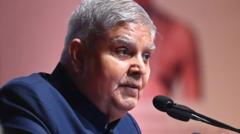In a televised address, Spanish Prime Minister Pedro Sánchez expressed regret over a corruption scandal involving a senior party official, while the opposition intensifies demands for his resignation, claiming "survival is no longer an option."
Spanish PM Apologizes Amid Growing Corruption Scandal

Spanish PM Apologizes Amid Growing Corruption Scandal
Pedro Sánchez seeks forgiveness from the Spanish populace as opposition calls for his resignation.
In a somber press conference, Prime Minister Pedro Sánchez apologized to the Spanish people amid an unfolding corruption scandal that led to the resignation of high-ranking Socialist party official Santos Cerdán. The scandal involves allegations of illicit public contract awards, resulting in Cerdán being summoned to testify in court.
Sánchez, who assumed the prime ministership in 2018, admitted his misjudgment in trusting Cerdán and emphasized that while there is no "zero corruption," there must be "zero tolerance." He firmly stated that there would be no early elections, despite mounting pressure from opposition leader Alberto Núñez Feijóo, who insisted that Sánchez's time in office should come to an end.
The former Secretary of the Socialist party, Santos Cerdán, announced his resignation to prepare for court testimony scheduled for June 25, maintaining his innocence against any criminal wrongdoing. This incident has put Sánchez's minority coalition government back under scrutiny, especially as Feijóo rallied support from his base in Madrid over the weekend, accusing Sánchez's government of corruption.
Sánchez's attempt to distance himself from the fallout was a bid to quell growing dissent within his coalition, particularly from left-wing partner Sumar's deputy prime minister, Yolanda Díaz, who also sought clarification on the issue. Following the press conference, Sánchez maintained his stance that he is not implicated in the corruption claims, condemning the opposition for politically exploiting the crisis.
With his government facing continuous challenges, Sánchez reflected on the inherent vulnerabilities of political power, having previously weathered political storms, including threats to resign when his wife's business dealings drew court attention. However, the Cerdán controversy marks a significant juncture, implicating one of his trusted allies while questioning the integrity within the Socialist party.
As investigations proceed and calls for accountability grow, Sánchez finds himself in a precarious position that could ultimately dictate the future of his administration. The case exemplifies the ongoing political tumult in Spain and reflects broader themes of governance and trust in political institutions.



















